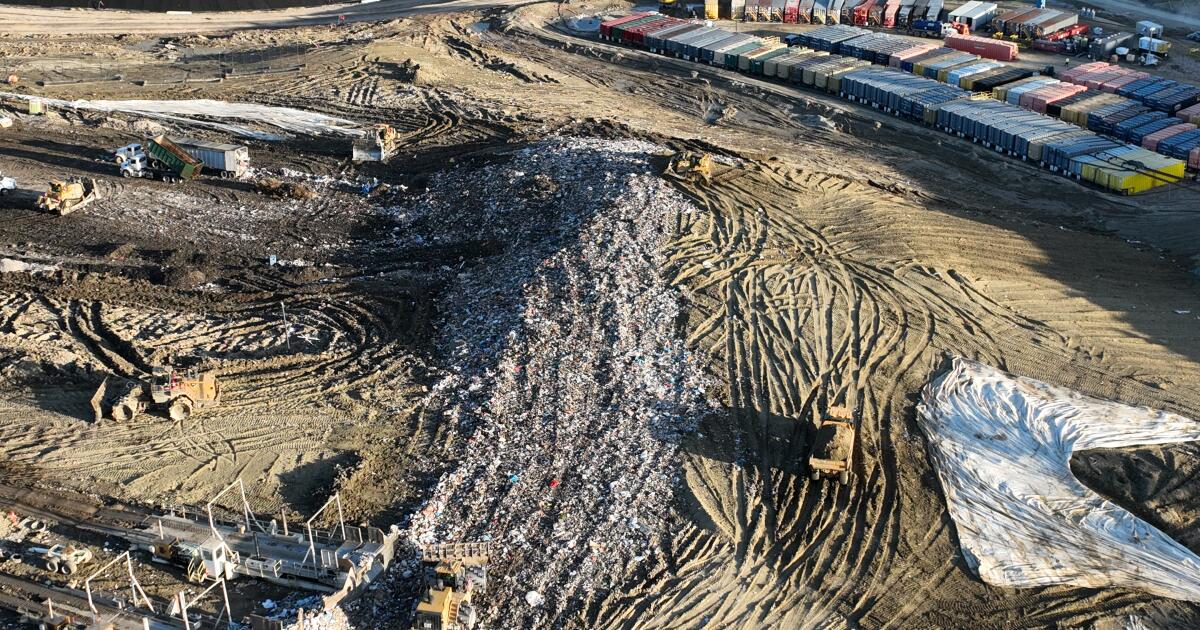A high-temperature chemical reaction has caused garbage to begin smoldering deep within a closed portion of the Chiquita Canyon Landfill, in Castaic. The underground fire — which could last for years — is releasing toxic air pollution and producing millions of gallons of liquid waste.
Although the U.S. Environmental Protection Agency has declared the crisis an “imminent and substantial endangerment” to nearby communities, many residents can’t afford to leave their homes to escape the noxious fumes.
With no end in sight, Los Angeles County Supervisor Kathryn Barger called on Waste Connections Inc., the landfill operator, to provide funds to assist residents who want to temporarily relocate until the problem is solved.
When the landfill-led relief program launched last week, Barger promoted the company’s website and released a statement suggesting she was pleased with its rollout.
But as residents began filling out applications, many became suspicious. The program website noted that it was launched by a New York law firm specializing in legal settlements. It required residents to provide detailed personal information. And to obtain relocation funding, residents were asked to sign a form with language that some found unsettling:
“By submitting this form you understand that any compensation received through this program is intended to compensate you for damages or injury you are claiming you have suffered from any odors or fumes emanating from the Chiquita Canyon landfill, including but not limited to adverse health effects (past, current, or future) …”
You’re reading Boiling Point
Sammy Roth gets you up to speed on climate change, energy and the environment. Sign up to get it in your inbox twice a week.
You may occasionally receive promotional content from the Los Angeles Times.
Oshea Orchid, an attorney representing a class of community members suing Chiquita Canyon and L.A. County for the landfill’s emissions, said she was concerned that the wording appeared to suggest that people seeking relocation funding would be waiving their right to seek compensation for future damages. Some of her clients who had previously applied for relief quickly withdrew their applications before receiving funding, claiming they had been misled.
“It just feels like that plan to try to get a waiver was really sneaky,” said Orchid, partner at Sethi, Orchid and Miner. “I don’t know if they just thought we wouldn’t catch it. I think they know that this litigation is going to be challenging from their side. Maybe they’re looking for any kind of procedural loophole to try to lessen the claims against the landfill.”
Following an inquiry by The Times, landfill officials said the application form was not intended to shield the operator from litigation. In response to criticism, they said they were revising the application’s text to reflect that position.
“In an effort to further clarify our Community Relief Program, we are making updates to our website and the application form to make it abundantly clear that anyone who participates in the Relief Program is not waiving any claims they may have against Chiquita Canyon Landfill or related entities, and is not waiving any additional damages to which they may be entitled,” Waste Connections Vice President John Perkey said in a statement to The Times.
Orchid doesn’t buy that. She said the program has already sowed distrust among community members who feel as though the landfill tried to use a charitable program to leverage a vulnerable community.
Barger told The Times she was unaware of any requirement that residents agree to conditions to receive relocation relief.
“My expectation is that the landfill’s proprietors are stepping up to my request for community support and will provide that support with no strings attached,” she said in a statement. “This will show they are working in good faith to meet the needs of the surrounding community. Anything less is unacceptable. “ But at the heart of the issue, Orchid argues the landfill never should have been allowed to administer the relocation program in the first place.
She noted that the landfill has also dedicated money for a separate program that provides affected residents with reimbursement for their utility bills (which are much higher from running air filters and air conditioning). But there’s a major distinction: L.A. County is responsible for running the program and dispensing the funding.
“People who are contacting me say, ‘It just feels wrong that I have to go to the landfill begging for help, when I would think my elected officials and the government should be,’” Orchid said.
The EPA is hosting a meeting at Castaic Middle School from 6-8 p.m. Thursday to update residents on the latest conditions observed at the landfill and next steps to resolve the chemical reaction.
ONE MORE THING
Southern California air regulators must adopt a rule establishing financial penalties for some the region’s largest polluters. For more than a decade, the South Coast Air Quality Management District allowed some of the heaviest polluters, including some oil refineries, to avoid paying federally mandated fees. As a result, the air district missed out on collecting over $200 million that it could have spent on clear air investments. After settling a lawsuit filed by a coalition of environmental groups, the air district has until November to approve new fees.
This column is the latest edition of Boiling Point, an email newsletter about climate change and the environment in California and the American West. You can sign up for Boiling Point here. And for more climate and environment news, follow @Sammy_Roth on X.
